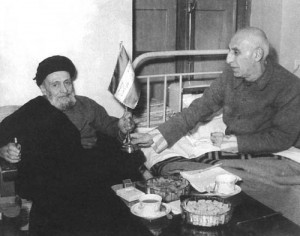Thursday
Aug192010
The Latest from Iran (19 August): Freedom & Detention
 Thursday, August 19, 2010 at 15:20
Thursday, August 19, 2010 at 15:20  2015 GMT: Political Prisoner Watch. Families of detainees who recently ended their hunger strike have still not received visit permits.
2015 GMT: Political Prisoner Watch. Families of detainees who recently ended their hunger strike have still not received visit permits.2010 GMT: Divorce Shocker! Ayatollah Safaei Bushehri, Friday Prayer leader and the Supreme Leader's representative in Bushehr, has revealed that 50% of marriage break-ups are caused by bad hijab.
2000 GMT: Parliament v. President. "Hardline" MP Hossein Nejabat has declared that Parliament's problems with the President did not exist during the administration of the reformist Mohammad Khatami (1997-2005). He said Ahmadinejad has to abide to the laws, otherwise he will be called before the Majlis.
In a more cautious statement, MP Hossein Sobhani-Nia sad that he hoped the Supreme Leader's words will induce the Government to implement the laws of Majlis and on the judiciary to remove possible problems with those laws.
NEW Rewriting Iran’s History: The 1953 Coup, the CIA, the Clerics, and “Democracy” (Emery)
NEW Iran Cartoon of the Day: 1953 Speaks to 2010
Iran Document: Nourizad’s Last Letter to Supreme Leader “The 10 Grievances”
Iran Feature: Sanctions, Iranians, and YouTube’s “Life in a Day” (Esfandiary)
UPDATED Iran Special: Have Fars (& Revolutionary Guard) Faked a Reformist “Confession” on Election?
The Latest from Iran (18 August): A Letter and A Call for Bombing
1945 GMT: Khamenei to US "Have I Made Myself Clear?". The Supreme Leader's office wants to be sure that Washington (and the rest of the world) gets Khamenei's point, made in his speech to senior Iranian officials --- Ahmadinejad, Rafsanjani, and Seyed Hassan Khomeini were in the audience --- that Tehran will not enter discussions over uranium enrichment unless Washington pulls back sanctions. Not only did they put out the lines on Twitter even before the speech had hit the Iranian media; they have now put out an English version of the statement: "Ayatollah Khamenei further reiterated that the Islamic Republic of Iran is ready to start negotiations provided that the US abandons its domineering attitude, puts an end to threats and sanctions and does not impose its goals on the negotiations."
Given the timing of mid-term Congressional elections in the US, it's a safe bet that there will not be a word breathed in Washington about a possible relaxation of sanctions. And that means there is no chance of public talks on Iran's nuclear programme before mid-November.
1700 GMT: Political Prisoner Watch. Golnaz Esfandiari has more on the case of detained women's rights activist Shiva Nazar Ahari, including this comment from Zahra Rahnavard: "We are worried for Shiva Nazar Ahari, her trial, and its result because we are all Shiva Nazar Ahari. We, women, who make up half of Iran’s population, we are all Shiva Nazar Ahari."
1420 GMT: Iran MediaWatch. Radio Farda has more on the ban on the newspaper Asia, which specialises in economic matters.
Asia has been critical of the economic policy of the Government, but the official reasons for its closure, according to Deputy Minister of Culture and Islamic Guidance Mohammad Ali Ramin, are "publishing pictures against public chastity", “promoting wastefulness and extravagance", and "persistence in carrying out the aforementioned violations".
1405 GMT: Sanctions Watch. Peyke Iran claims that, after the Swiss Government's adoption of additional sanctions against Tehran, the assets of 40 Iranian companies have been blocked.
According to Fars News, Venezuela has said it will continue to supply Iran with gasoline despite sanctions.
David Velasquez, Venezuela's ambassador to Tehran, said, "We are at the service of Iran, and whenever Iran needs, we will supply it with gasoline."
1400 GMT: Political Prisoner Watch (Nourizad Edition). Back to our opening story today....
Video from RASA TV of Mohammad Nourizad's celebration with well-wishers before his return to prison has now been posted.
0910 GMT: I will be in meetings today about the Journal of American Studies, so updates will be limited until mid-afternoon.
0855 GMT: Political Prisoner Watch (Nokia Siemens Lawsuit Edition). Golnaz Esfandiari interviews Edward Moawad, the lawyer for detained journalist Isa Saharkhiz, who has filed a motion in US Federal Court against Nokia Siemens for provision of equipment to Iran assisting in surveillance. Moawad claims, "njuries to the main plaintiff here, Isa Saharkhiz, and to [his son] Mehdi and multiple others were inflicted as a result of the actions of Nokia Siemens network."
0850 GMT: The Battle Within. The latest journalist to consider the escalating tension within the Iranian political system is Robert Tait of Radio Free Europe/Radio Liberty, who sees the root cause as President Ahmadinejad's "religious-nationalist" approach.
0840 GMT: Political Prisoner Watch. Gozaar offers a detailed profile of human rights activist Shiva Nazar Ahari, detained since July 2009. Her lawyer says a trial date is set for 4 September on charges of "mohareb" (war on God), which carries a death sentence.
Academic and Mir Hossein Mousavi advisor Ali Arab Mazar has been released from detention on $200,000 bail. He was arrested on 28 December and was in solitary confinement for three months.
0735 GMT: Political Prisoner Watch. The Pro-Vice Chancellor of Britain's Durham University, Anthony Forster, has expressed concern over the health and situation of Ehsan Abdoh-Tabrizi, a Ph.D. student imprisoned in mid-January after travelling to Tehran to visit his family.
Forster said Durham, in agreement with Abdoh-Tabrizi's father, had taken a low-profile approach after the arrest, conducting discussions with the Iranian Embassy in London; however, Durham's most recent letter had not been acknowledged by the embassy.
0730 GMT: We have published two features linking the 19 August 1953 coup that overthrew the Mossadegh Government and today's events in Iran. In Nikahang Kowsar's cartoon, Mohammad Mossadegh offers advice to Mir Hossein Mousavi, and Chris Emery has serious issues with a Washington Post article which claims to revise the history of the coup.
0625 GMT: Execution (Ashtiani) Watch. Britain's Foreign Office minister Alistair Burt summoned the Iranian ambassador, Rasoul Movahedian, on Wednesday to raise the case of Sakineh Mohammadi Ashtiani, the woman sentenced to death for adultery. Burt also brought up the situation of seven members of the Baha'i faith, each sentenced to 20 years on charges of spying for Israel. and of Ebrahim Hamidi, who faces execution for sodomy.
Turkish officials have told Zaman that Ankara has also brought up Ashtiani's case in discussions with Iranian counterparts.
0605 GMT: Wednesday was marked by a series of statements: from the rhetoric of the Supreme Leader (don't mention internal matters, focus on relations with the US) to the declarations of opposition figures like Mir Hossein Mousavi and Mehdi Karroubi (this Government is discredited; the Iranian people will emerge and prevail) to the letter from journalist and filmmaker Mohammad Nourizad, now returned to Evin Prison, to Ayatollah Khamenei (here are the grievances against you and the system that you have led into disrepute).
But, at the end of the day, we noted this item, sent from an EA correspondent: Oxford University student Mohammad Reza Jalaeipour, seized by Iranian forces earlier this year after he was told to collect his passport, has been released from detention after 66 days in solitary confinement. The news was confirmed by his wife Fatemeh Shams, also a student at Oxford, who spoke to him by phone.
In total, Jalaeipour has spent 111 days in solitary confinement since the 2009 Presidential elections. It is unknown how much bail was posted for his release, and it is unclear whether he will get back his passport in time for the new academic year.
And we also saw the photograph, one of a set, that we are using for this post: Mohammad Nourizad, having written his 6th letter to the Supreme Leader in the knowledge that it would bring a summons from the authorities, is surrounded by well-wishers as he prepares for his return to prison.
tagged  Ali Arab Mazar,
Ali Arab Mazar,  Alistair Burt,
Alistair Burt,  Anthony Forster,
Anthony Forster,  Asia newspaper (Iran),
Asia newspaper (Iran),  Ayatollah Ali Khamenei,
Ayatollah Ali Khamenei,  Ayatollah Safaei Bushehri,
Ayatollah Safaei Bushehri,  Baha'i,
Baha'i,  Britain,
Britain,  Chris Emery,
Chris Emery,  Durham University,
Durham University,  Ebrahim Hamidi,
Ebrahim Hamidi,  Edward Moawad,
Edward Moawad,  Ehsan Abdoh-Tabrizi,
Ehsan Abdoh-Tabrizi,  Fars News,
Fars News,  Fatemeh Shams,
Fatemeh Shams,  Gozaar,
Gozaar,  Hossein Nejbat,
Hossein Nejbat,  Hossein Sobhani-Nia,
Hossein Sobhani-Nia,  Iran,
Iran,  Isa Saharkhiz,
Isa Saharkhiz,  Mahmoud Ahmadinejad,
Mahmoud Ahmadinejad,  Mehdi Karroubi,
Mehdi Karroubi,  Mehdi Saharkhiz,
Mehdi Saharkhiz,  Mir Hossein Mousavi,
Mir Hossein Mousavi,  Mohammad Ali Ramin,
Mohammad Ali Ramin,  Mohammad Khatami,
Mohammad Khatami,  Mohammad Reza Jalaeipour,
Mohammad Reza Jalaeipour,  Nikahang Kowsar,
Nikahang Kowsar,  Nokia Siemens,
Nokia Siemens,  Peyke Iran,
Peyke Iran,  Radio Farda,
Radio Farda,  Radio Free Europe/Radio Liberty,
Radio Free Europe/Radio Liberty,  Rasoul Movahedian,
Rasoul Movahedian,  Robert Tait,
Robert Tait,  Sakineh Mohammadi-Ashtiani,
Sakineh Mohammadi-Ashtiani,  Shiva Nazar Ahari,
Shiva Nazar Ahari,  Switzerland,
Switzerland,  Turkey,
Turkey,  Venezuela,
Venezuela,  Washington Post,
Washington Post,  Zahra Rahnavard,
Zahra Rahnavard,  Zaman in
Zaman in  Middle East & Iran
Middle East & Iran
 Ali Arab Mazar,
Ali Arab Mazar,  Alistair Burt,
Alistair Burt,  Anthony Forster,
Anthony Forster,  Asia newspaper (Iran),
Asia newspaper (Iran),  Ayatollah Ali Khamenei,
Ayatollah Ali Khamenei,  Ayatollah Safaei Bushehri,
Ayatollah Safaei Bushehri,  Baha'i,
Baha'i,  Britain,
Britain,  Chris Emery,
Chris Emery,  Durham University,
Durham University,  Ebrahim Hamidi,
Ebrahim Hamidi,  Edward Moawad,
Edward Moawad,  Ehsan Abdoh-Tabrizi,
Ehsan Abdoh-Tabrizi,  Fars News,
Fars News,  Fatemeh Shams,
Fatemeh Shams,  Gozaar,
Gozaar,  Hossein Nejbat,
Hossein Nejbat,  Hossein Sobhani-Nia,
Hossein Sobhani-Nia,  Iran,
Iran,  Isa Saharkhiz,
Isa Saharkhiz,  Mahmoud Ahmadinejad,
Mahmoud Ahmadinejad,  Mehdi Karroubi,
Mehdi Karroubi,  Mehdi Saharkhiz,
Mehdi Saharkhiz,  Mir Hossein Mousavi,
Mir Hossein Mousavi,  Mohammad Ali Ramin,
Mohammad Ali Ramin,  Mohammad Khatami,
Mohammad Khatami,  Mohammad Reza Jalaeipour,
Mohammad Reza Jalaeipour,  Nikahang Kowsar,
Nikahang Kowsar,  Nokia Siemens,
Nokia Siemens,  Peyke Iran,
Peyke Iran,  Radio Farda,
Radio Farda,  Radio Free Europe/Radio Liberty,
Radio Free Europe/Radio Liberty,  Rasoul Movahedian,
Rasoul Movahedian,  Robert Tait,
Robert Tait,  Sakineh Mohammadi-Ashtiani,
Sakineh Mohammadi-Ashtiani,  Shiva Nazar Ahari,
Shiva Nazar Ahari,  Switzerland,
Switzerland,  Turkey,
Turkey,  Venezuela,
Venezuela,  Washington Post,
Washington Post,  Zahra Rahnavard,
Zahra Rahnavard,  Zaman in
Zaman in  Middle East & Iran
Middle East & Iran 
